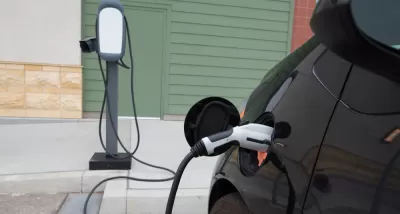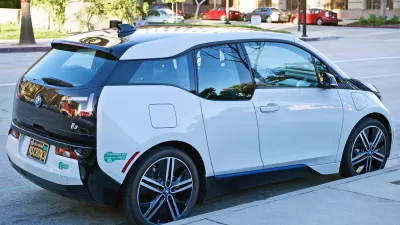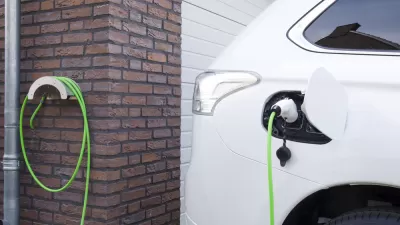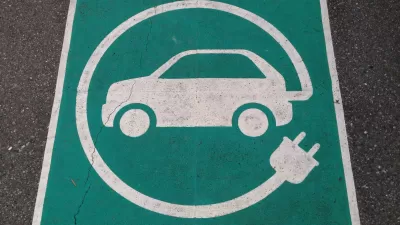Gov. Jerry Brown signed 12 bills on Oct. 10 to facilitate the transition from oil-powered light and heavy duty vehicles to electric power in California, and thus meet his goal of putting 1.5 million zero-emission vehicles on the road by 2025.

As a result of Tuesday's bill-signings, electric vehicles (EVs) will continue to drive in carpool lanes and may soon be able to charge their vehicles at state parks and beaches as part of a pilot program. EVs could also charge on city streets should a city decide to authorize curbside chargers.
Whether the new laws will stem the increase in greenhouse gas emissions from the transportation sector, blamed in part not so much to fleet composition but the increase in vehicle-miles-traveled, may have to wait till the new greenhouse gas inventory report issued by the California Air Resources Board.
Joseph Bebon describes the remaining eight bills (six listed below) signed by Gov. Brown for NGT News, an online news site covering alternative fuel vehicles.
- Brown signed A.B.739, which requires at least 15% of specified heavy-duty vehicles newly purchased by state agencies to be zero-emission vehicle (ZEVs) beginning in 2025 and at least 30% of those vehicles to be ZEVs beginning in 2030. The bill was authored by State Assemblymember Ed Chau, D-Monterey Park.
- S.B.498, authored by Sen. Nancy Skinner (D-Berkeley) and sponsored by NextGen America, a nonprofit headed by California businessman and philanthropist Tom Steyer, strengthens and codifies the light-duty vehicle fleet purchase requirements currently included in Brown's 2012 executive order setting targets for zero-emission vehicles.
- A.B.615 by Assemblymember Jim Cooper, D-Elk Grove: Extends the income caps for the Clean Vehicle Rebate Project to continue providing air quality and GHG reduction benefits through programs that encourage the purchase of ZEVs.
- A.B.1073 by Assemblymember Eduardo Garcia, D-Coachella: Extends the [20 percent] requirement for funding of early deployment of [zero and near-zero emissions] heavy-duty trucks as part of California’s Clean Truck, Bus and Off-Road Vehicle program
Not all bills specifically promote electric vehicles. Some target older, more polluting vehicles, and ensure they are replaced with cleaner ones:
- A.B.188 "requires the California Air Resources Board (ARB) to make older, high-polluting pickup trucks eligible for replacement under the state vehicle retirement and replacement program," according to author Assemblymember Rudy Salas Jr., D-Bakersfield.
- A.B.630 by Assemblymember Jim Cooper, D-Elk Grove: Codifies a clean-car program that benefits low-income residents by helping them replace high-polluting vehicles with cleaner and more efficient vehicles.
The ultimate legislation, to simply "ban the sale of new cars powered by internal-combustion engines after 2040" is under consideration by Assemblyman Phil Ting (D-San Francisco), reports Alexei Koseff on Sept. 29 for The Sacramento Bee. Gov. Brown has expressed interest in enacting such a ban.
Hat tip to AASHTO Daily Transportation Update.
FULL STORY: California Gov. Signs Bundle of Clean Transportation Bills into Law

Maui's Vacation Rental Debate Turns Ugly
Verbal attacks, misinformation campaigns and fistfights plague a high-stakes debate to convert thousands of vacation rentals into long-term housing.

Planetizen Federal Action Tracker
A weekly monitor of how Trump’s orders and actions are impacting planners and planning in America.

In Urban Planning, AI Prompting Could be the New Design Thinking
Creativity has long been key to great urban design. What if we see AI as our new creative partner?

King County Supportive Housing Program Offers Hope for Unhoused Residents
The county is taking a ‘Housing First’ approach that prioritizes getting people into housing, then offering wraparound supportive services.

Researchers Use AI to Get Clearer Picture of US Housing
Analysts are using artificial intelligence to supercharge their research by allowing them to comb through data faster. Though these AI tools can be error prone, they save time and housing researchers are optimistic about the future.

Making Shared Micromobility More Inclusive
Cities and shared mobility system operators can do more to include people with disabilities in planning and operations, per a new report.
Urban Design for Planners 1: Software Tools
This six-course series explores essential urban design concepts using open source software and equips planners with the tools they need to participate fully in the urban design process.
Planning for Universal Design
Learn the tools for implementing Universal Design in planning regulations.
planning NEXT
Appalachian Highlands Housing Partners
Mpact (founded as Rail~Volution)
City of Camden Redevelopment Agency
City of Astoria
City of Portland
City of Laramie





























